International Management: Cultural Dimensions Case Study Report
VerifiedAdded on 2020/03/02
|9
|2217
|96
Report
AI Summary
This report analyzes a case study involving Lee, a Korean individual who faced challenges adapting to the workplace culture in Korea after living in Australia for an extended period. The report applies Hofstede's five cultural dimensions model (Power Distance, Individualism, Masculinity, Uncertainty Avoidance, and Long-Term Orientation) to explain the issues Lee encountered, such as difficulties forming relationships with colleagues and the lack of consideration for his suggestions. It explores the company's high Power Distance, Individualism, Uncertainty Avoidance, and Long-Term Orientation scores, which contributed to Lee's feelings of isolation and demotivation. The report suggests actions Lee could take to adapt to the Korean workplace culture, including adjusting his appearance and conforming to company rules. Additionally, it discusses how Korean managers can address the challenges posed by individualistic employees, emphasizing the importance of fostering team efforts, providing clear goals, and promoting a more flexible and inclusive organizational culture. The conclusion emphasizes the need for managers to reward collaborative behavior to improve overall organizational efficiency.
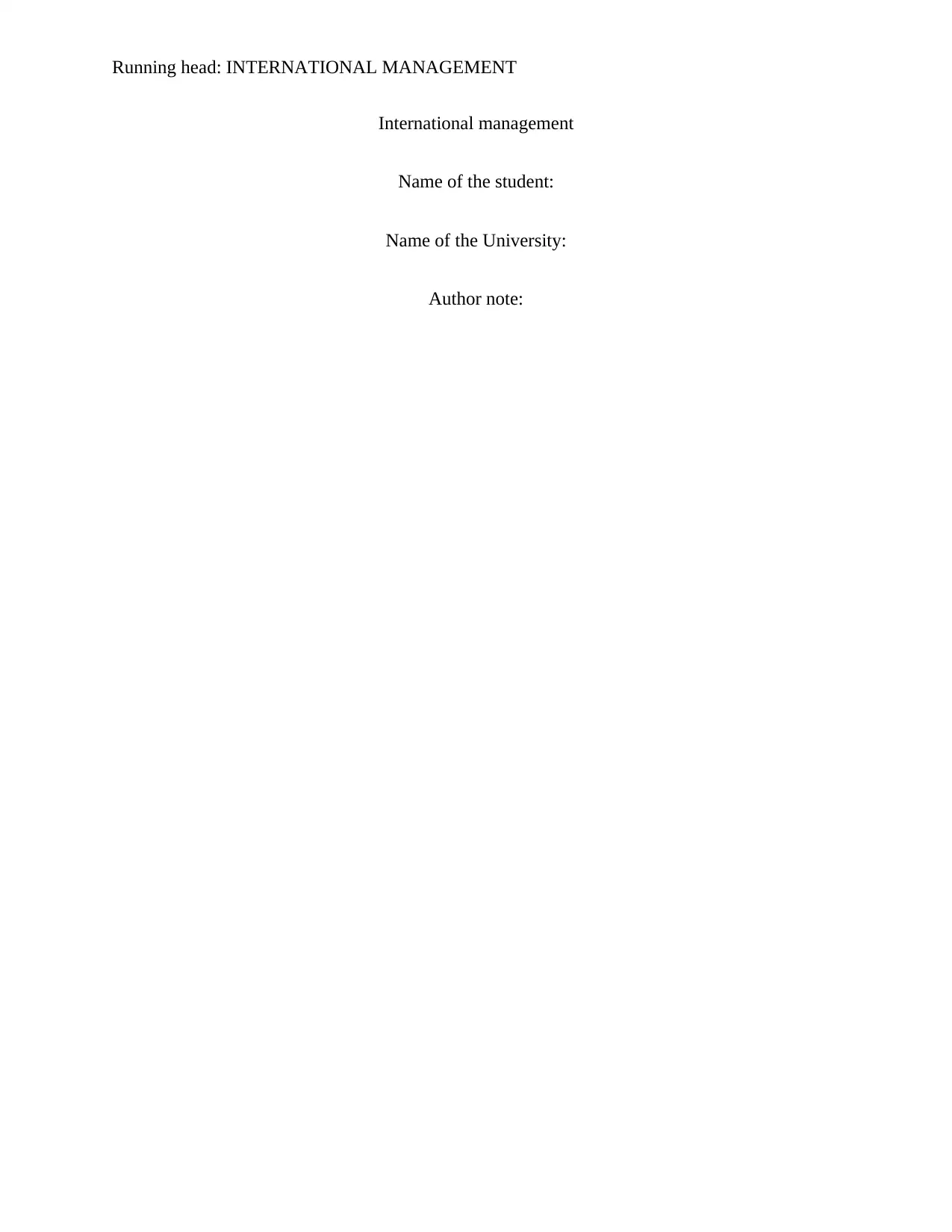
Running head: INTERNATIONAL MANAGEMENT
International management
Name of the student:
Name of the University:
Author note:
International management
Name of the student:
Name of the University:
Author note:
Paraphrase This Document
Need a fresh take? Get an instant paraphrase of this document with our AI Paraphraser
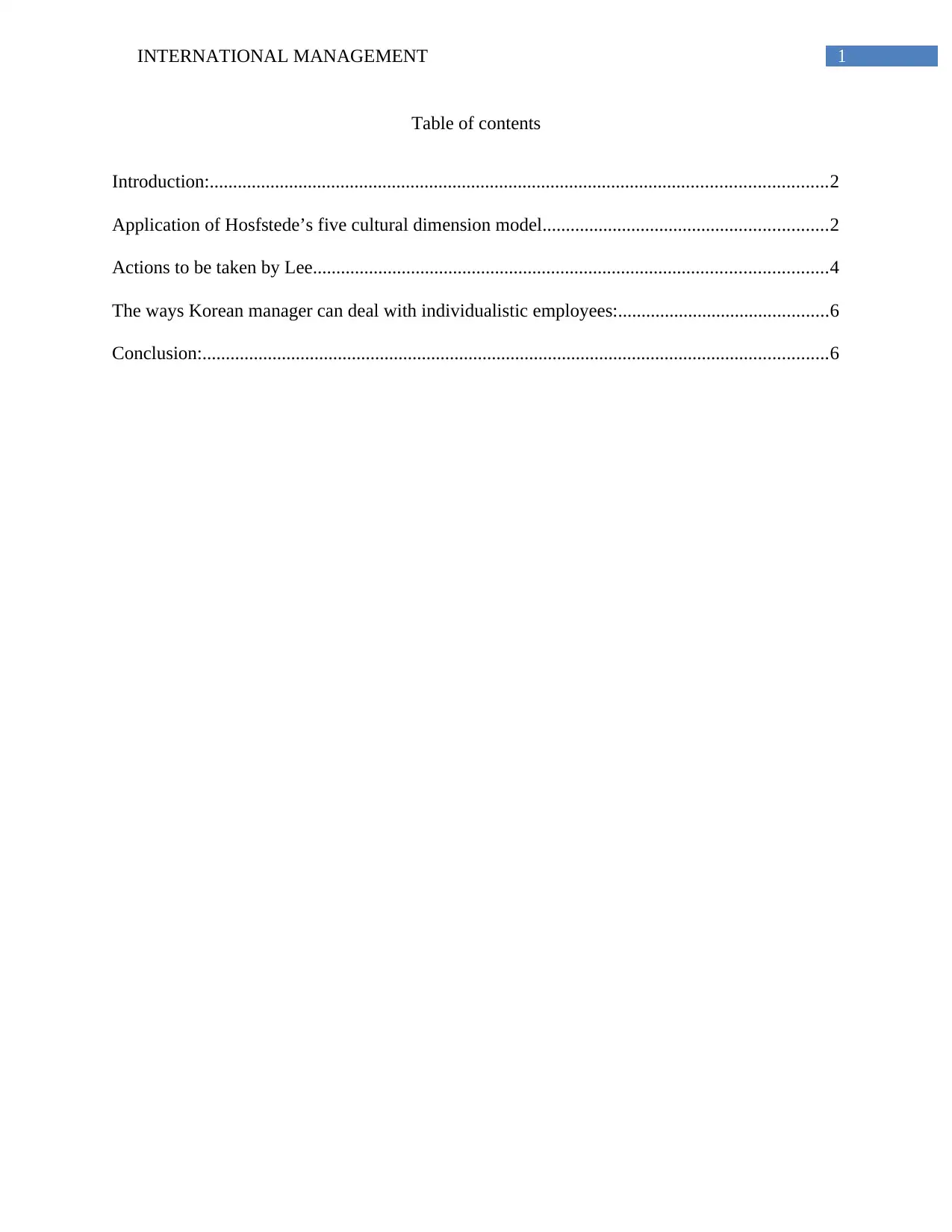
1INTERNATIONAL MANAGEMENT
Table of contents
Introduction:....................................................................................................................................2
Application of Hosfstede’s five cultural dimension model.............................................................2
Actions to be taken by Lee..............................................................................................................4
The ways Korean manager can deal with individualistic employees:.............................................6
Conclusion:......................................................................................................................................6
Table of contents
Introduction:....................................................................................................................................2
Application of Hosfstede’s five cultural dimension model.............................................................2
Actions to be taken by Lee..............................................................................................................4
The ways Korean manager can deal with individualistic employees:.............................................6
Conclusion:......................................................................................................................................6
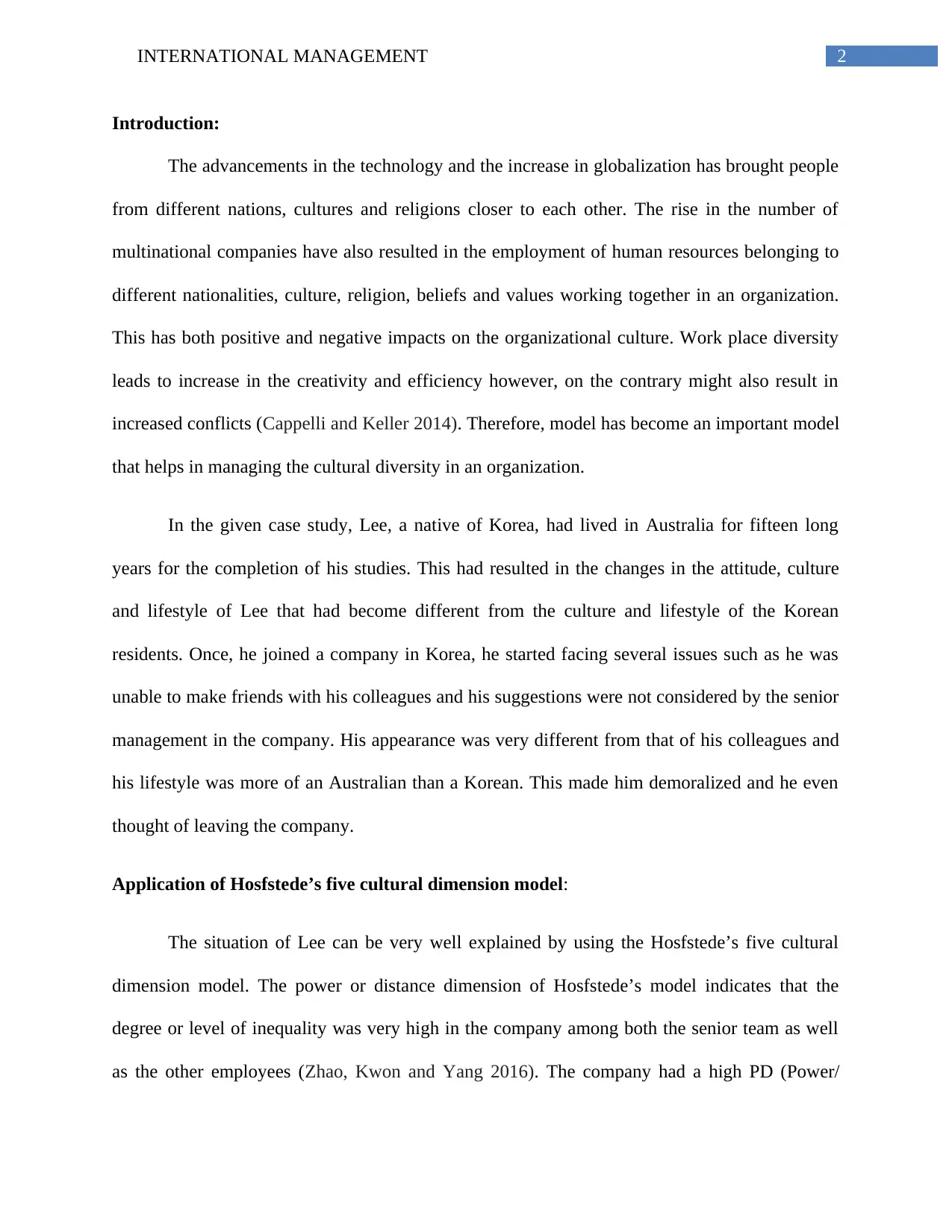
2INTERNATIONAL MANAGEMENT
Introduction:
The advancements in the technology and the increase in globalization has brought people
from different nations, cultures and religions closer to each other. The rise in the number of
multinational companies have also resulted in the employment of human resources belonging to
different nationalities, culture, religion, beliefs and values working together in an organization.
This has both positive and negative impacts on the organizational culture. Work place diversity
leads to increase in the creativity and efficiency however, on the contrary might also result in
increased conflicts (Cappelli and Keller 2014). Therefore, model has become an important model
that helps in managing the cultural diversity in an organization.
In the given case study, Lee, a native of Korea, had lived in Australia for fifteen long
years for the completion of his studies. This had resulted in the changes in the attitude, culture
and lifestyle of Lee that had become different from the culture and lifestyle of the Korean
residents. Once, he joined a company in Korea, he started facing several issues such as he was
unable to make friends with his colleagues and his suggestions were not considered by the senior
management in the company. His appearance was very different from that of his colleagues and
his lifestyle was more of an Australian than a Korean. This made him demoralized and he even
thought of leaving the company.
Application of Hosfstede’s five cultural dimension model:
The situation of Lee can be very well explained by using the Hosfstede’s five cultural
dimension model. The power or distance dimension of Hosfstede’s model indicates that the
degree or level of inequality was very high in the company among both the senior team as well
as the other employees (Zhao, Kwon and Yang 2016). The company had a high PD (Power/
Introduction:
The advancements in the technology and the increase in globalization has brought people
from different nations, cultures and religions closer to each other. The rise in the number of
multinational companies have also resulted in the employment of human resources belonging to
different nationalities, culture, religion, beliefs and values working together in an organization.
This has both positive and negative impacts on the organizational culture. Work place diversity
leads to increase in the creativity and efficiency however, on the contrary might also result in
increased conflicts (Cappelli and Keller 2014). Therefore, model has become an important model
that helps in managing the cultural diversity in an organization.
In the given case study, Lee, a native of Korea, had lived in Australia for fifteen long
years for the completion of his studies. This had resulted in the changes in the attitude, culture
and lifestyle of Lee that had become different from the culture and lifestyle of the Korean
residents. Once, he joined a company in Korea, he started facing several issues such as he was
unable to make friends with his colleagues and his suggestions were not considered by the senior
management in the company. His appearance was very different from that of his colleagues and
his lifestyle was more of an Australian than a Korean. This made him demoralized and he even
thought of leaving the company.
Application of Hosfstede’s five cultural dimension model:
The situation of Lee can be very well explained by using the Hosfstede’s five cultural
dimension model. The power or distance dimension of Hosfstede’s model indicates that the
degree or level of inequality was very high in the company among both the senior team as well
as the other employees (Zhao, Kwon and Yang 2016). The company had a high PD (Power/
⊘ This is a preview!⊘
Do you want full access?
Subscribe today to unlock all pages.

Trusted by 1+ million students worldwide
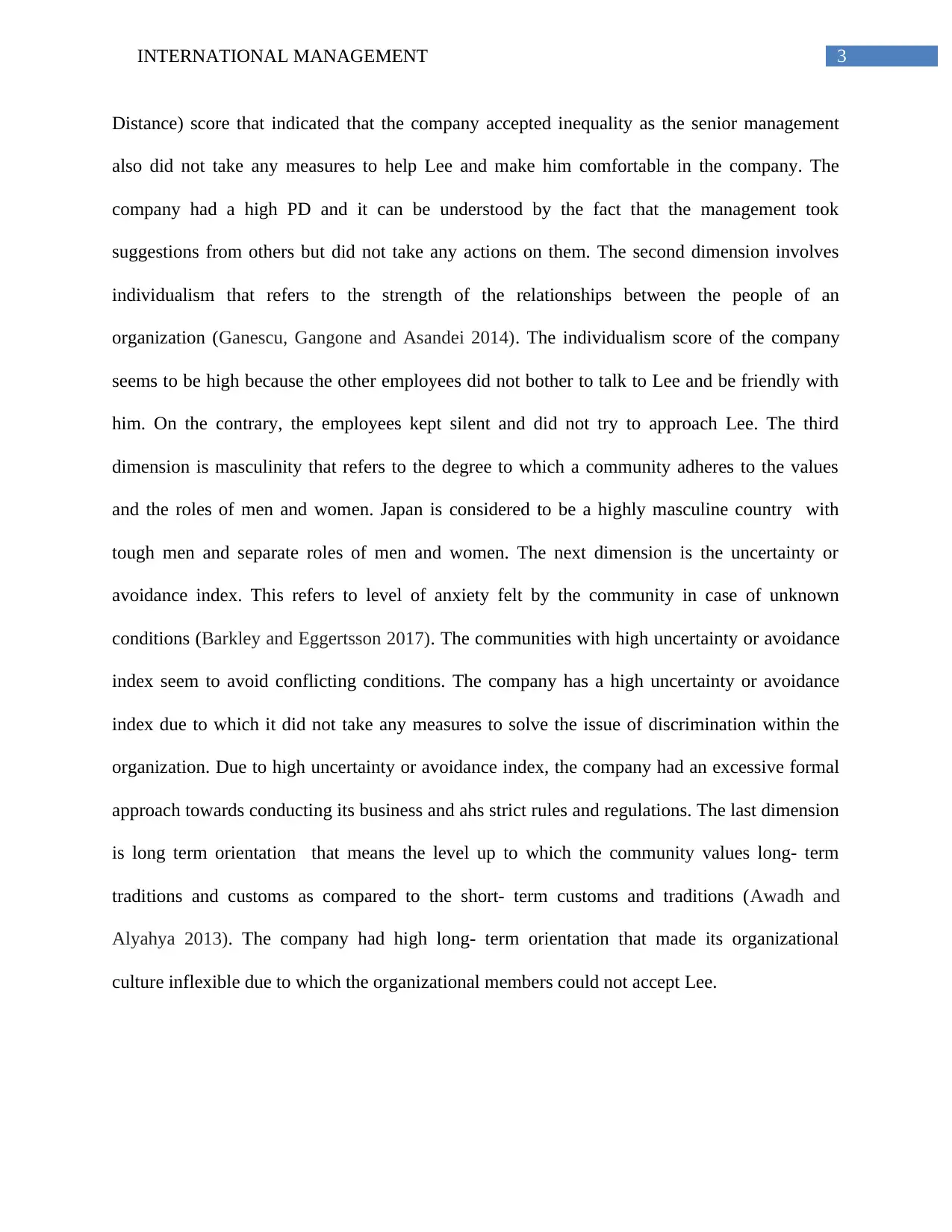
3INTERNATIONAL MANAGEMENT
Distance) score that indicated that the company accepted inequality as the senior management
also did not take any measures to help Lee and make him comfortable in the company. The
company had a high PD and it can be understood by the fact that the management took
suggestions from others but did not take any actions on them. The second dimension involves
individualism that refers to the strength of the relationships between the people of an
organization (Ganescu, Gangone and Asandei 2014). The individualism score of the company
seems to be high because the other employees did not bother to talk to Lee and be friendly with
him. On the contrary, the employees kept silent and did not try to approach Lee. The third
dimension is masculinity that refers to the degree to which a community adheres to the values
and the roles of men and women. Japan is considered to be a highly masculine country with
tough men and separate roles of men and women. The next dimension is the uncertainty or
avoidance index. This refers to level of anxiety felt by the community in case of unknown
conditions (Barkley and Eggertsson 2017). The communities with high uncertainty or avoidance
index seem to avoid conflicting conditions. The company has a high uncertainty or avoidance
index due to which it did not take any measures to solve the issue of discrimination within the
organization. Due to high uncertainty or avoidance index, the company had an excessive formal
approach towards conducting its business and ahs strict rules and regulations. The last dimension
is long term orientation that means the level up to which the community values long- term
traditions and customs as compared to the short- term customs and traditions (Awadh and
Alyahya 2013). The company had high long- term orientation that made its organizational
culture inflexible due to which the organizational members could not accept Lee.
Distance) score that indicated that the company accepted inequality as the senior management
also did not take any measures to help Lee and make him comfortable in the company. The
company had a high PD and it can be understood by the fact that the management took
suggestions from others but did not take any actions on them. The second dimension involves
individualism that refers to the strength of the relationships between the people of an
organization (Ganescu, Gangone and Asandei 2014). The individualism score of the company
seems to be high because the other employees did not bother to talk to Lee and be friendly with
him. On the contrary, the employees kept silent and did not try to approach Lee. The third
dimension is masculinity that refers to the degree to which a community adheres to the values
and the roles of men and women. Japan is considered to be a highly masculine country with
tough men and separate roles of men and women. The next dimension is the uncertainty or
avoidance index. This refers to level of anxiety felt by the community in case of unknown
conditions (Barkley and Eggertsson 2017). The communities with high uncertainty or avoidance
index seem to avoid conflicting conditions. The company has a high uncertainty or avoidance
index due to which it did not take any measures to solve the issue of discrimination within the
organization. Due to high uncertainty or avoidance index, the company had an excessive formal
approach towards conducting its business and ahs strict rules and regulations. The last dimension
is long term orientation that means the level up to which the community values long- term
traditions and customs as compared to the short- term customs and traditions (Awadh and
Alyahya 2013). The company had high long- term orientation that made its organizational
culture inflexible due to which the organizational members could not accept Lee.
Paraphrase This Document
Need a fresh take? Get an instant paraphrase of this document with our AI Paraphraser
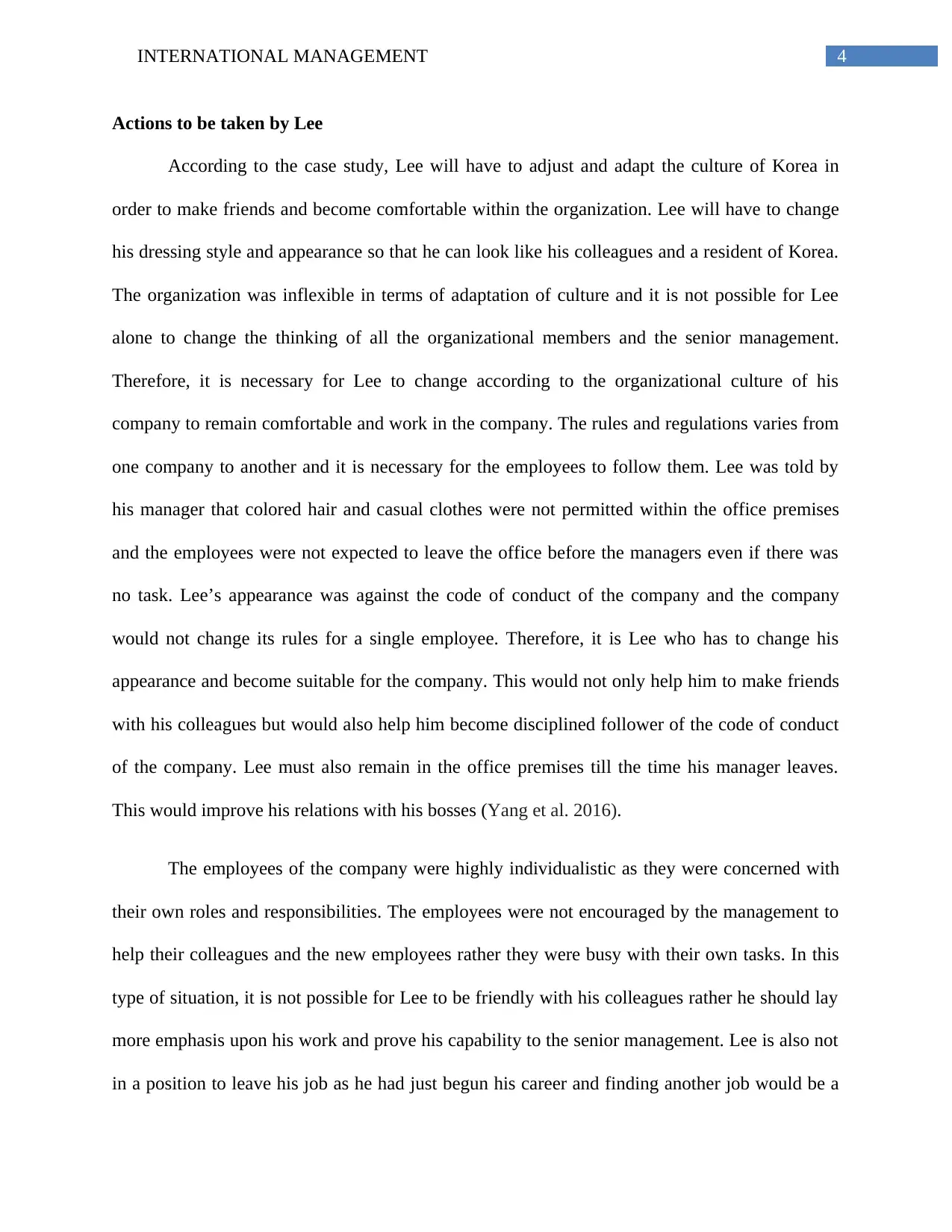
4INTERNATIONAL MANAGEMENT
Actions to be taken by Lee
According to the case study, Lee will have to adjust and adapt the culture of Korea in
order to make friends and become comfortable within the organization. Lee will have to change
his dressing style and appearance so that he can look like his colleagues and a resident of Korea.
The organization was inflexible in terms of adaptation of culture and it is not possible for Lee
alone to change the thinking of all the organizational members and the senior management.
Therefore, it is necessary for Lee to change according to the organizational culture of his
company to remain comfortable and work in the company. The rules and regulations varies from
one company to another and it is necessary for the employees to follow them. Lee was told by
his manager that colored hair and casual clothes were not permitted within the office premises
and the employees were not expected to leave the office before the managers even if there was
no task. Lee’s appearance was against the code of conduct of the company and the company
would not change its rules for a single employee. Therefore, it is Lee who has to change his
appearance and become suitable for the company. This would not only help him to make friends
with his colleagues but would also help him become disciplined follower of the code of conduct
of the company. Lee must also remain in the office premises till the time his manager leaves.
This would improve his relations with his bosses (Yang et al. 2016).
The employees of the company were highly individualistic as they were concerned with
their own roles and responsibilities. The employees were not encouraged by the management to
help their colleagues and the new employees rather they were busy with their own tasks. In this
type of situation, it is not possible for Lee to be friendly with his colleagues rather he should lay
more emphasis upon his work and prove his capability to the senior management. Lee is also not
in a position to leave his job as he had just begun his career and finding another job would be a
Actions to be taken by Lee
According to the case study, Lee will have to adjust and adapt the culture of Korea in
order to make friends and become comfortable within the organization. Lee will have to change
his dressing style and appearance so that he can look like his colleagues and a resident of Korea.
The organization was inflexible in terms of adaptation of culture and it is not possible for Lee
alone to change the thinking of all the organizational members and the senior management.
Therefore, it is necessary for Lee to change according to the organizational culture of his
company to remain comfortable and work in the company. The rules and regulations varies from
one company to another and it is necessary for the employees to follow them. Lee was told by
his manager that colored hair and casual clothes were not permitted within the office premises
and the employees were not expected to leave the office before the managers even if there was
no task. Lee’s appearance was against the code of conduct of the company and the company
would not change its rules for a single employee. Therefore, it is Lee who has to change his
appearance and become suitable for the company. This would not only help him to make friends
with his colleagues but would also help him become disciplined follower of the code of conduct
of the company. Lee must also remain in the office premises till the time his manager leaves.
This would improve his relations with his bosses (Yang et al. 2016).
The employees of the company were highly individualistic as they were concerned with
their own roles and responsibilities. The employees were not encouraged by the management to
help their colleagues and the new employees rather they were busy with their own tasks. In this
type of situation, it is not possible for Lee to be friendly with his colleagues rather he should lay
more emphasis upon his work and prove his capability to the senior management. Lee is also not
in a position to leave his job as he had just begun his career and finding another job would be a
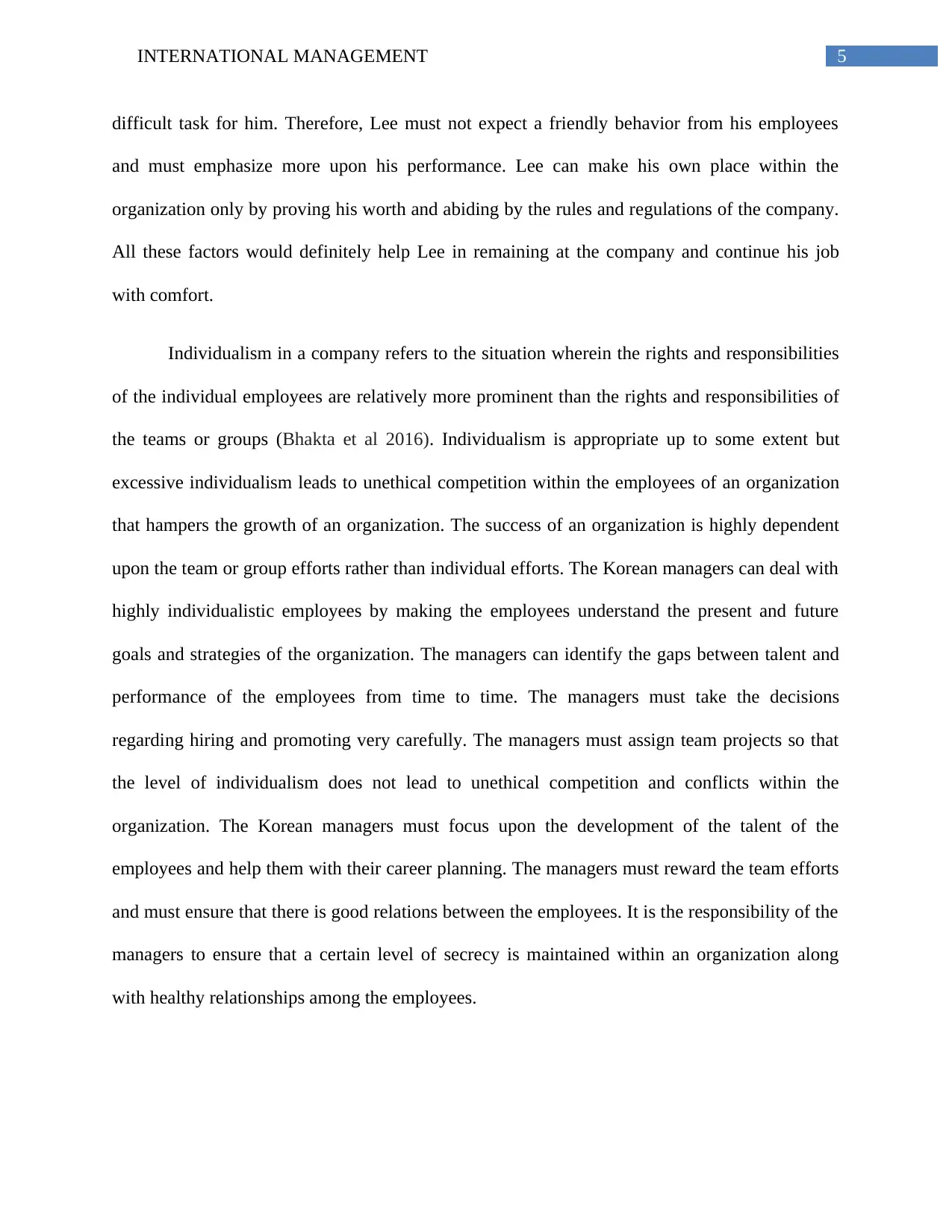
5INTERNATIONAL MANAGEMENT
difficult task for him. Therefore, Lee must not expect a friendly behavior from his employees
and must emphasize more upon his performance. Lee can make his own place within the
organization only by proving his worth and abiding by the rules and regulations of the company.
All these factors would definitely help Lee in remaining at the company and continue his job
with comfort.
Individualism in a company refers to the situation wherein the rights and responsibilities
of the individual employees are relatively more prominent than the rights and responsibilities of
the teams or groups (Bhakta et al 2016). Individualism is appropriate up to some extent but
excessive individualism leads to unethical competition within the employees of an organization
that hampers the growth of an organization. The success of an organization is highly dependent
upon the team or group efforts rather than individual efforts. The Korean managers can deal with
highly individualistic employees by making the employees understand the present and future
goals and strategies of the organization. The managers can identify the gaps between talent and
performance of the employees from time to time. The managers must take the decisions
regarding hiring and promoting very carefully. The managers must assign team projects so that
the level of individualism does not lead to unethical competition and conflicts within the
organization. The Korean managers must focus upon the development of the talent of the
employees and help them with their career planning. The managers must reward the team efforts
and must ensure that there is good relations between the employees. It is the responsibility of the
managers to ensure that a certain level of secrecy is maintained within an organization along
with healthy relationships among the employees.
difficult task for him. Therefore, Lee must not expect a friendly behavior from his employees
and must emphasize more upon his performance. Lee can make his own place within the
organization only by proving his worth and abiding by the rules and regulations of the company.
All these factors would definitely help Lee in remaining at the company and continue his job
with comfort.
Individualism in a company refers to the situation wherein the rights and responsibilities
of the individual employees are relatively more prominent than the rights and responsibilities of
the teams or groups (Bhakta et al 2016). Individualism is appropriate up to some extent but
excessive individualism leads to unethical competition within the employees of an organization
that hampers the growth of an organization. The success of an organization is highly dependent
upon the team or group efforts rather than individual efforts. The Korean managers can deal with
highly individualistic employees by making the employees understand the present and future
goals and strategies of the organization. The managers can identify the gaps between talent and
performance of the employees from time to time. The managers must take the decisions
regarding hiring and promoting very carefully. The managers must assign team projects so that
the level of individualism does not lead to unethical competition and conflicts within the
organization. The Korean managers must focus upon the development of the talent of the
employees and help them with their career planning. The managers must reward the team efforts
and must ensure that there is good relations between the employees. It is the responsibility of the
managers to ensure that a certain level of secrecy is maintained within an organization along
with healthy relationships among the employees.
⊘ This is a preview!⊘
Do you want full access?
Subscribe today to unlock all pages.

Trusted by 1+ million students worldwide
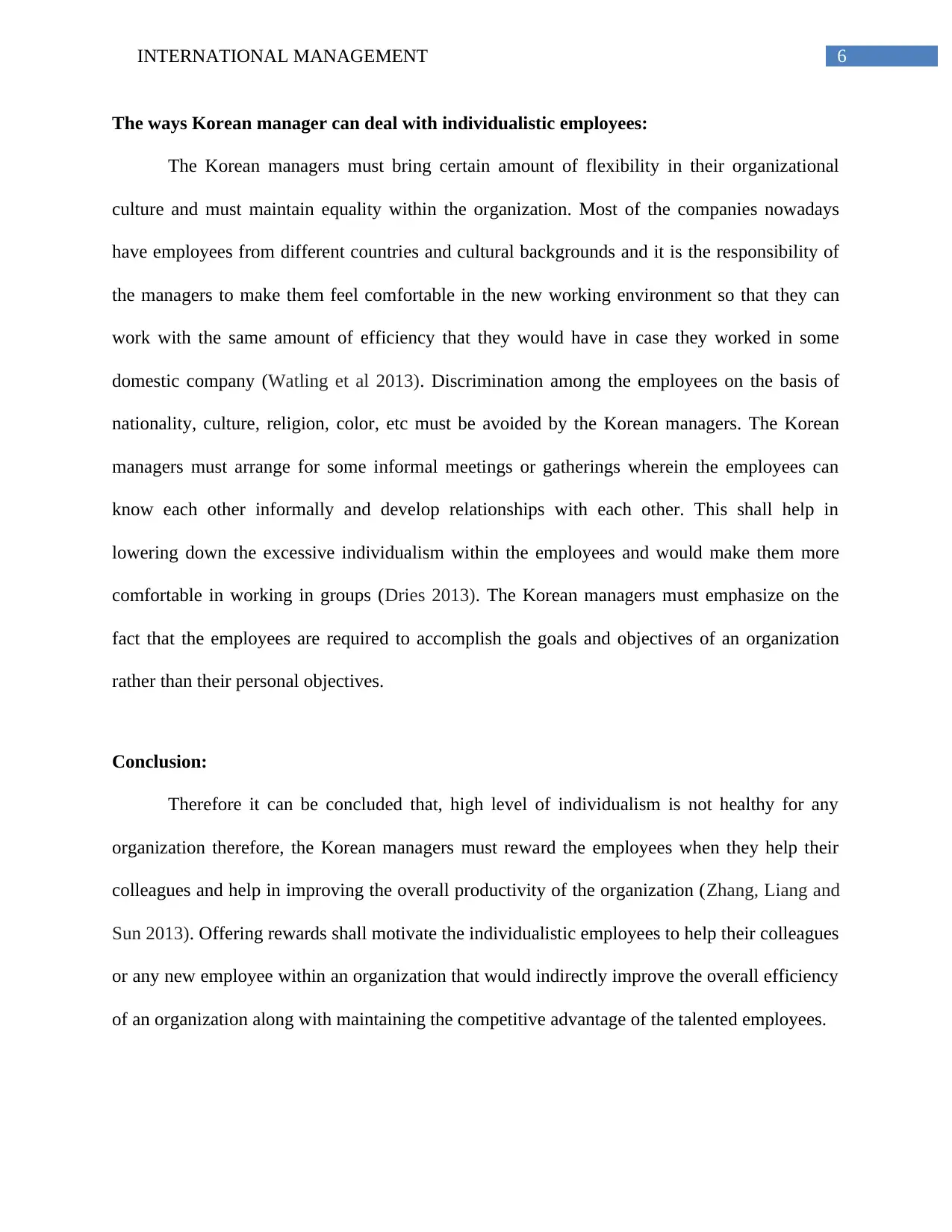
6INTERNATIONAL MANAGEMENT
The ways Korean manager can deal with individualistic employees:
The Korean managers must bring certain amount of flexibility in their organizational
culture and must maintain equality within the organization. Most of the companies nowadays
have employees from different countries and cultural backgrounds and it is the responsibility of
the managers to make them feel comfortable in the new working environment so that they can
work with the same amount of efficiency that they would have in case they worked in some
domestic company (Watling et al 2013). Discrimination among the employees on the basis of
nationality, culture, religion, color, etc must be avoided by the Korean managers. The Korean
managers must arrange for some informal meetings or gatherings wherein the employees can
know each other informally and develop relationships with each other. This shall help in
lowering down the excessive individualism within the employees and would make them more
comfortable in working in groups (Dries 2013). The Korean managers must emphasize on the
fact that the employees are required to accomplish the goals and objectives of an organization
rather than their personal objectives.
Conclusion:
Therefore it can be concluded that, high level of individualism is not healthy for any
organization therefore, the Korean managers must reward the employees when they help their
colleagues and help in improving the overall productivity of the organization (Zhang, Liang and
Sun 2013). Offering rewards shall motivate the individualistic employees to help their colleagues
or any new employee within an organization that would indirectly improve the overall efficiency
of an organization along with maintaining the competitive advantage of the talented employees.
The ways Korean manager can deal with individualistic employees:
The Korean managers must bring certain amount of flexibility in their organizational
culture and must maintain equality within the organization. Most of the companies nowadays
have employees from different countries and cultural backgrounds and it is the responsibility of
the managers to make them feel comfortable in the new working environment so that they can
work with the same amount of efficiency that they would have in case they worked in some
domestic company (Watling et al 2013). Discrimination among the employees on the basis of
nationality, culture, religion, color, etc must be avoided by the Korean managers. The Korean
managers must arrange for some informal meetings or gatherings wherein the employees can
know each other informally and develop relationships with each other. This shall help in
lowering down the excessive individualism within the employees and would make them more
comfortable in working in groups (Dries 2013). The Korean managers must emphasize on the
fact that the employees are required to accomplish the goals and objectives of an organization
rather than their personal objectives.
Conclusion:
Therefore it can be concluded that, high level of individualism is not healthy for any
organization therefore, the Korean managers must reward the employees when they help their
colleagues and help in improving the overall productivity of the organization (Zhang, Liang and
Sun 2013). Offering rewards shall motivate the individualistic employees to help their colleagues
or any new employee within an organization that would indirectly improve the overall efficiency
of an organization along with maintaining the competitive advantage of the talented employees.
Paraphrase This Document
Need a fresh take? Get an instant paraphrase of this document with our AI Paraphraser
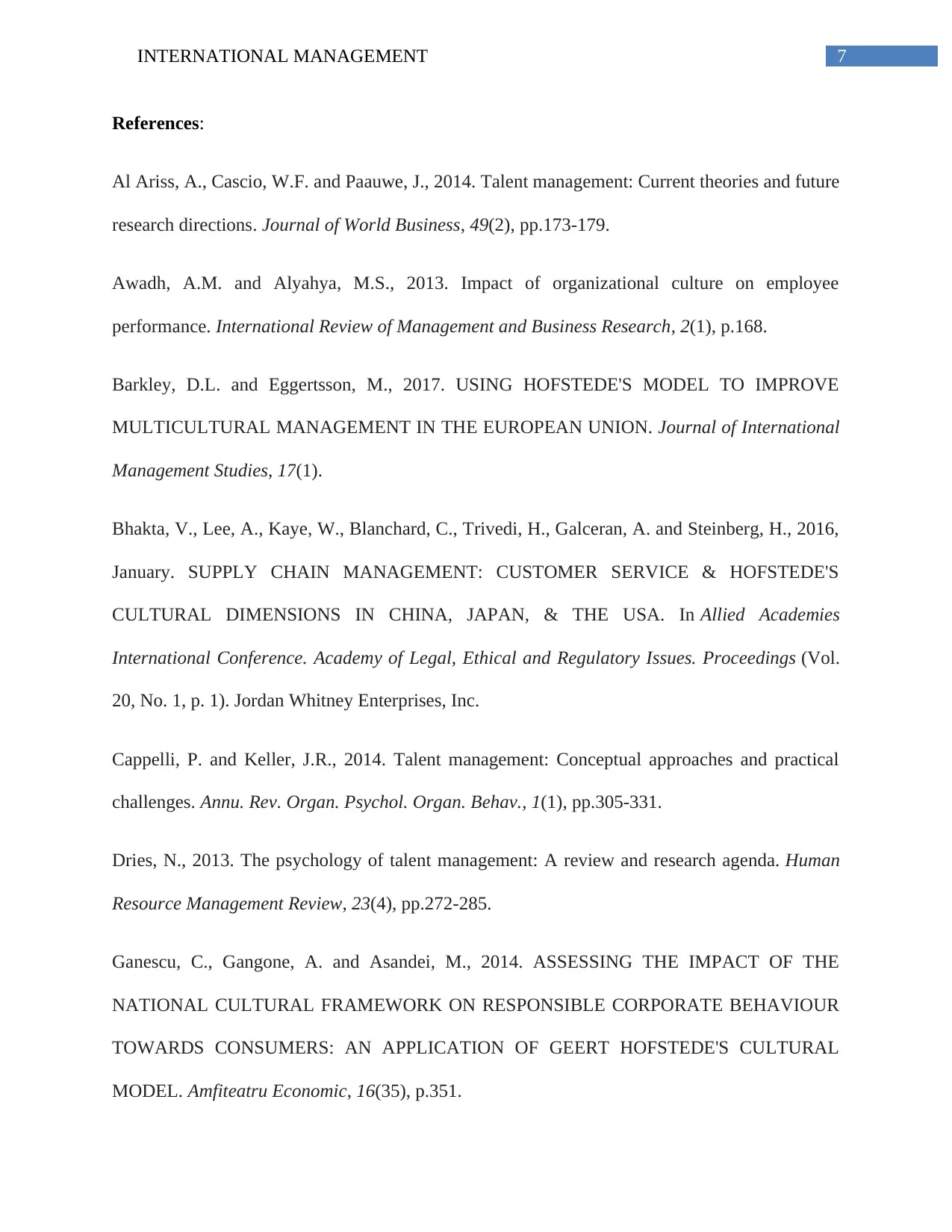
7INTERNATIONAL MANAGEMENT
References:
Al Ariss, A., Cascio, W.F. and Paauwe, J., 2014. Talent management: Current theories and future
research directions. Journal of World Business, 49(2), pp.173-179.
Awadh, A.M. and Alyahya, M.S., 2013. Impact of organizational culture on employee
performance. International Review of Management and Business Research, 2(1), p.168.
Barkley, D.L. and Eggertsson, M., 2017. USING HOFSTEDE'S MODEL TO IMPROVE
MULTICULTURAL MANAGEMENT IN THE EUROPEAN UNION. Journal of International
Management Studies, 17(1).
Bhakta, V., Lee, A., Kaye, W., Blanchard, C., Trivedi, H., Galceran, A. and Steinberg, H., 2016,
January. SUPPLY CHAIN MANAGEMENT: CUSTOMER SERVICE & HOFSTEDE'S
CULTURAL DIMENSIONS IN CHINA, JAPAN, & THE USA. In Allied Academies
International Conference. Academy of Legal, Ethical and Regulatory Issues. Proceedings (Vol.
20, No. 1, p. 1). Jordan Whitney Enterprises, Inc.
Cappelli, P. and Keller, J.R., 2014. Talent management: Conceptual approaches and practical
challenges. Annu. Rev. Organ. Psychol. Organ. Behav., 1(1), pp.305-331.
Dries, N., 2013. The psychology of talent management: A review and research agenda. Human
Resource Management Review, 23(4), pp.272-285.
Ganescu, C., Gangone, A. and Asandei, M., 2014. ASSESSING THE IMPACT OF THE
NATIONAL CULTURAL FRAMEWORK ON RESPONSIBLE CORPORATE BEHAVIOUR
TOWARDS CONSUMERS: AN APPLICATION OF GEERT HOFSTEDE'S CULTURAL
MODEL. Amfiteatru Economic, 16(35), p.351.
References:
Al Ariss, A., Cascio, W.F. and Paauwe, J., 2014. Talent management: Current theories and future
research directions. Journal of World Business, 49(2), pp.173-179.
Awadh, A.M. and Alyahya, M.S., 2013. Impact of organizational culture on employee
performance. International Review of Management and Business Research, 2(1), p.168.
Barkley, D.L. and Eggertsson, M., 2017. USING HOFSTEDE'S MODEL TO IMPROVE
MULTICULTURAL MANAGEMENT IN THE EUROPEAN UNION. Journal of International
Management Studies, 17(1).
Bhakta, V., Lee, A., Kaye, W., Blanchard, C., Trivedi, H., Galceran, A. and Steinberg, H., 2016,
January. SUPPLY CHAIN MANAGEMENT: CUSTOMER SERVICE & HOFSTEDE'S
CULTURAL DIMENSIONS IN CHINA, JAPAN, & THE USA. In Allied Academies
International Conference. Academy of Legal, Ethical and Regulatory Issues. Proceedings (Vol.
20, No. 1, p. 1). Jordan Whitney Enterprises, Inc.
Cappelli, P. and Keller, J.R., 2014. Talent management: Conceptual approaches and practical
challenges. Annu. Rev. Organ. Psychol. Organ. Behav., 1(1), pp.305-331.
Dries, N., 2013. The psychology of talent management: A review and research agenda. Human
Resource Management Review, 23(4), pp.272-285.
Ganescu, C., Gangone, A. and Asandei, M., 2014. ASSESSING THE IMPACT OF THE
NATIONAL CULTURAL FRAMEWORK ON RESPONSIBLE CORPORATE BEHAVIOUR
TOWARDS CONSUMERS: AN APPLICATION OF GEERT HOFSTEDE'S CULTURAL
MODEL. Amfiteatru Economic, 16(35), p.351.
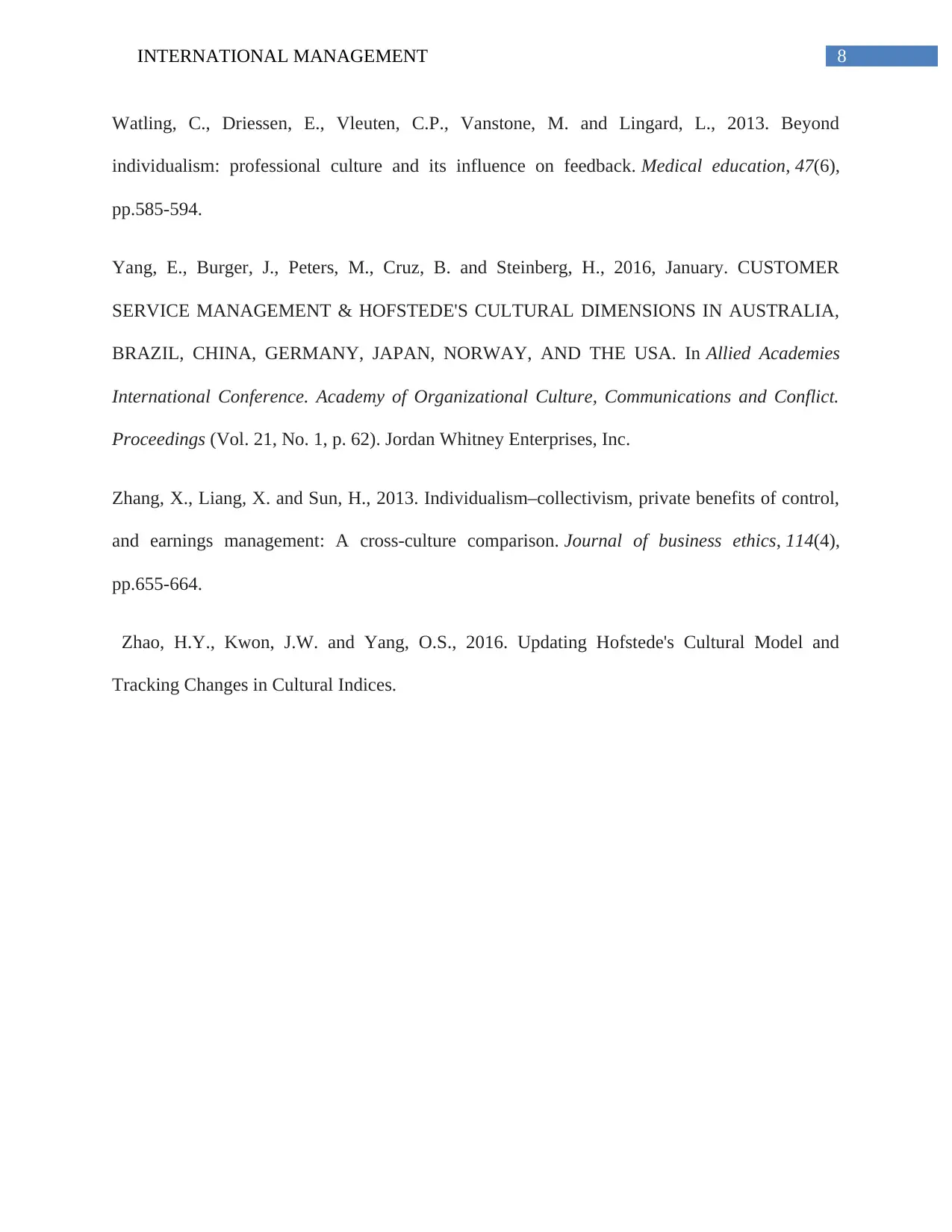
8INTERNATIONAL MANAGEMENT
Watling, C., Driessen, E., Vleuten, C.P., Vanstone, M. and Lingard, L., 2013. Beyond
individualism: professional culture and its influence on feedback. Medical education, 47(6),
pp.585-594.
Yang, E., Burger, J., Peters, M., Cruz, B. and Steinberg, H., 2016, January. CUSTOMER
SERVICE MANAGEMENT & HOFSTEDE'S CULTURAL DIMENSIONS IN AUSTRALIA,
BRAZIL, CHINA, GERMANY, JAPAN, NORWAY, AND THE USA. In Allied Academies
International Conference. Academy of Organizational Culture, Communications and Conflict.
Proceedings (Vol. 21, No. 1, p. 62). Jordan Whitney Enterprises, Inc.
Zhang, X., Liang, X. and Sun, H., 2013. Individualism–collectivism, private benefits of control,
and earnings management: A cross-culture comparison. Journal of business ethics, 114(4),
pp.655-664.
Zhao, H.Y., Kwon, J.W. and Yang, O.S., 2016. Updating Hofstede's Cultural Model and
Tracking Changes in Cultural Indices.
Watling, C., Driessen, E., Vleuten, C.P., Vanstone, M. and Lingard, L., 2013. Beyond
individualism: professional culture and its influence on feedback. Medical education, 47(6),
pp.585-594.
Yang, E., Burger, J., Peters, M., Cruz, B. and Steinberg, H., 2016, January. CUSTOMER
SERVICE MANAGEMENT & HOFSTEDE'S CULTURAL DIMENSIONS IN AUSTRALIA,
BRAZIL, CHINA, GERMANY, JAPAN, NORWAY, AND THE USA. In Allied Academies
International Conference. Academy of Organizational Culture, Communications and Conflict.
Proceedings (Vol. 21, No. 1, p. 62). Jordan Whitney Enterprises, Inc.
Zhang, X., Liang, X. and Sun, H., 2013. Individualism–collectivism, private benefits of control,
and earnings management: A cross-culture comparison. Journal of business ethics, 114(4),
pp.655-664.
Zhao, H.Y., Kwon, J.W. and Yang, O.S., 2016. Updating Hofstede's Cultural Model and
Tracking Changes in Cultural Indices.
⊘ This is a preview!⊘
Do you want full access?
Subscribe today to unlock all pages.

Trusted by 1+ million students worldwide
1 out of 9
Related Documents
Your All-in-One AI-Powered Toolkit for Academic Success.
+13062052269
info@desklib.com
Available 24*7 on WhatsApp / Email
![[object Object]](/_next/static/media/star-bottom.7253800d.svg)
Unlock your academic potential
Copyright © 2020–2026 A2Z Services. All Rights Reserved. Developed and managed by ZUCOL.





